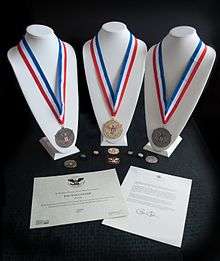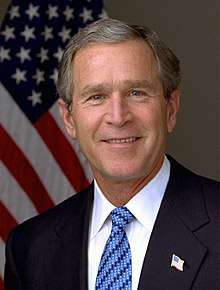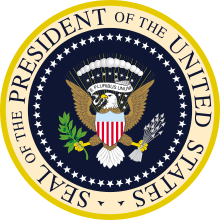President's Volunteer Service Award
The President's Volunteer Service Award is a civil award bestowed by the President of the United States. Established by executive order by George W. Bush, the award was established to honor volunteers that give hundreds of hours per year helping others through the President's Council on Service and Civic Participation. The award can be granted to individuals, families and organizations located throughout the United States. Depending on the amount of service hours completed, individuals can receive the Bronze, Silver, Gold, and/or the President's Call to Service Award (also referred to the President's Lifetime Achievement Award).[1] The Call to Service Award is the most prestigious, and it has been awarded to few Americans to recognize over 4,000 hours of extraordinary service including notable honorees such as S. Truett Cathy, Mark Carman, Zach Bonner. Awardees may receive a personalized certificate, an official pin, medallion, and/or a congratulatory letter from the President depending on the award earned.
| President's Volunteer Service Award | |
|---|---|
| Awarded for | Recognition of outstanding volunteer contributions in community service to the United States |
| Sponsored by | Corporation for National and Community Service President of the United States Points of Light Foundation |
| Country | United States |
| Presented by | The President of the United States |
| First awarded | 2003 |
| Website | Official website |

Purpose and establishment
The purpose for the President's Volunteer Service Award is to honor the hundreds of thousands of people across America that have volunteered hundreds, if not thousands of volunteer hours over their lifetime. The program was established to honor the volunteer works of individuals, families and organizations throughout the United States. There have been several variations of this program using different names, including the President's Volunteer Action Award from the 1980s.
The current program is called the President's Volunteer Service Award and was created by President George W. Bush in 2002. He made this program known during his State of the Union address. In January 2003, President George W. Bush created an Executive Order that created the President's Council on Service and Civic Participation. The Council was established to recognize the important contributions Americans of all ages are making within their communities through service and civic engagement. The President's Volunteer Service Award is now an initiative of the Corporation for National and Community Service and the Points of Light Institute.[2]
After 9/11
After September 11, 2001, President Bush saw the need to renew the interest in helping our neighbors and called upon all Americans to help by volunteering their time. As part of this request, he created several new programs, including the Citizen Corps and to go along with these new programs, the President's Volunteer Service Award to be given to those the help to make a difference.
Tracking hours
Volunteers are requested to maintain a log of hours that are volunteered and when requesting a President's Volunteer Service Award are required to present this information for certification. Individuals may use a regular sheet of paper or sign up to track their hours. The President's Volunteer Service Award website has a place for individuals and group to register and track the hours that have been volunteered.[3]
Notable recipients
- Mark Carman, music producer, singer, songwriter, and social activist, 2016, for work with the White House on Gun Control and other social issues.[4]
- Sander van der Linden, social psychologist, popular science writer, for his work on helping to promote peace through improved intercultural and intergroup relations.[5]
- George Oldroyd, advocate for disabled youth[6], the most-decorated Scout lifesaver in history[7], and once the youngest recipient of the President's Call to Service Award (the original name for The President's Lifetime Achievement Award).
Certifying organizations
There are thousands of organizations that recognize their volunteers with the President's Volunteer Service Award annually. The program uses two groups of organizations to certify awards.
- Certifying Organization
- Certifying organizations (COs) are an essential part of the PVSA equation. A CO is an organization that has been granted authority through an application and review process to administer the PVSA to volunteers. We look to COs to verify that volunteers meet all requirements to be awarded the PVSA.
- Leadership Organizations
- Leadership Organizations (LOs) are typically the governing body or headquarters for a company or nonprofit and have multiple sub-organizations, business units or affiliates associated with them. Similar to a Certifying Organization (CO), they must adhere to the program criteria, confirm volunteer eligibility and conduct themselves according to the terms and conditions that govern the program. The difference is that Leadership Organizations must commit to recognizing a minimum of 1,000 volunteers each year, agree to central billing and agree to promote the PVSA program through its communications channels. As a benefit, they have the opportunity to customize certificates for internal distribution and use on intranet sites, along with added value opportunities that may arise. Examples of LOs include Boys & Girls Clubs of America, Bank of America, AT&T, and Morgan Stanley.
Types of Organizations
- Nonprofit
- Community or faith-based organization
- Business or Corporation
- School or college
- National service program (AmeriCorp)
- Civic, fraternal or service organization
- Membership or trade association
- Federal, state or local government agency
See also
| Wikimedia Commons has media related to President's Volunteer Service Award. |
References
- "The Award". Presidentialserviceawards.gov. Retrieved 2015-12-21.
- "IC System Earns President's Volunteer Service Award".
- "Certifying Organizations". Presidentialserviceawards.gov. Retrieved 2015-12-22.
- [http://www.cnn.com/videos/tv/2016/01/05/exp-obama-announces- new-gun-control-measures.cnn. Retrieved 15 March 2017]
- "Biography". University of Cambridge. Retrieved 27 May 2017.
- bit.ly/InMotionMagazine-12-2018
- bit.ly/InMotionMagazine-12-2018

